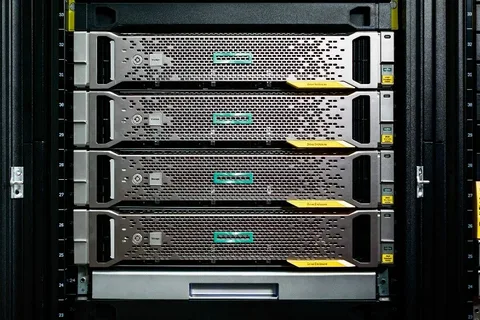The Importance of Regular Server Health Checks in Preventing Downtime
Businesses / Posted 7 months ago by Network Attach Storage / 53 views
In today’s digital age, the reliability and performance of servers are critical for businesses. Best Servers are the backbone of an organization’s IT infrastructure, and any disruption can lead to costly downtime, data loss, and reputational damage. Regular server health checks play a crucial role in ensuring that servers remain operational and optimized, preventing potential failures before they escalate into serious issues. By consistently monitoring the health of servers, businesses can identify performance bottlenecks, security vulnerabilities, and hardware degradation, ensuring smooth and uninterrupted operations.
Understanding Server Health Checks
Server health checks are routine assessments of a server’s performance, functionality, and security. These checks help detect potential problems such as hardware failures, software bugs, network issues, or storage bottlenecks. Regular health checks involve examining key performance indicators like CPU usage, memory consumption, disk space, network activity, and system logs.
By continuously monitoring these metrics, administrators can detect anomalies and take proactive measures to fix them before they cause outages. Server health checks also provide insights into system inefficiencies and underutilized resources, allowing for better optimization and resource allocation.
Preventing Unexpected Downtime
Unexpected server downtime can have serious repercussions for businesses, leading to lost revenue, productivity, and customer trust. A significant portion of downtime can be attributed to issues that go unnoticed until they become critical. Regular server health checks allow IT teams to catch these issues early on, preventing sudden failures that could disrupt business operations.
For example, a server might be running out of disk space due to an unexpected increase in data usage. Without monitoring, this could result in the server becoming unresponsive, causing applications to crash. A routine health check would flag the low disk space, allowing administrators to free up storage or add capacity before the problem escalates.
Additionally, server health checks can reveal hardware components that are nearing the end of their life. Early detection of failing hard drives, power supplies, or network cards ensures that they can be replaced before a catastrophic failure occurs.
Optimizing Server Performance
Regular server health checks are essential for maintaining optimal performance. Over time, servers can experience performance degradation due to resource overconsumption, inefficient software configurations, or increasing workloads. As businesses grow, their servers need to handle more users, transactions, and data. Without consistent health monitoring, these growing demands can overwhelm the server, leading to slow response times or even crashes.
By performing regular checks, IT teams can analyze system resource usage and identify areas where performance improvements can be made. For instance, high CPU or memory usage might indicate that a particular application is consuming more resources than necessary. By optimizing software configurations, upgrading hardware, or redistributing workloads, businesses can improve server performance and ensure a seamless user experience.
Enhancing Security through Regular Monitoring
Server health checks are not only about performance but also about security. Servers are a prime target for cyberattacks, and any vulnerabilities can be exploited by hackers. Regular server system health checks help identify security gaps, outdated software, and unauthorized access attempts, allowing businesses to take immediate action to protect their systems.
During a health check, administrators can review system logs for suspicious activity, check for unpatched vulnerabilities, and ensure that all security protocols are up to date. This proactive approach helps prevent security breaches that could lead to data theft, financial losses, or damage to a company’s reputation. Furthermore, regular monitoring helps businesses comply with regulatory requirements for data security, reducing the risk of penalties due to non-compliance.
Ensuring Hardware Longevity
Servers are made up of numerous hardware components that can degrade over time. Hard drives can fail, power supplies can weaken, and cooling systems can malfunction. Regular server health checks help detect signs of hardware wear and tear, allowing businesses to replace or repair components before they fail completely.
For example, monitoring the temperature of the server’s internal components can reveal issues with the cooling system. If a server is running too hot, it can cause hardware components to wear out faster, reducing their lifespan. By addressing cooling issues early, businesses can extend the life of their servers and avoid costly hardware replacements.
Moreover, regular health checks can identify areas where hardware upgrades may be necessary to handle growing demands. Upgrading memory, adding additional storage, or replacing outdated processors can significantly improve server performance and reliability.
Reducing Maintenance Costs
While some businesses may view server health checks as an additional operational cost, they actually lead to long-term savings. Preventative maintenance is always more cost-effective than emergency repairs or downtime. Unplanned server failures often result in emergency IT interventions, costly repairs, and lost productivity. By regularly checking the health of servers, businesses can avoid these unexpected expenses and maintain more predictable operational costs.
In addition, routine health checks allow businesses to plan for future upgrades and maintenance, spreading out costs over time rather than facing large, unexpected expenses. This proactive approach to server management minimizes the risk of costly downtime and extends the lifespan of the server infrastructure.
Conclusion
Regular server software health checks are a vital part of maintaining system reliability, performance, and security. By consistently monitoring server health, businesses can prevent unexpected downtime, optimize performance, enhance security, and extend hardware longevity. In a world where business operations are increasingly dependent on digital infrastructure, ensuring that servers are healthy and well-maintained is essential for minimizing risks and maximizing productivity. The investment in regular server health checks is a small price to pay compared to the potential costs of server failures, data breaches, or performance issues.
- Listing ID: 25825

